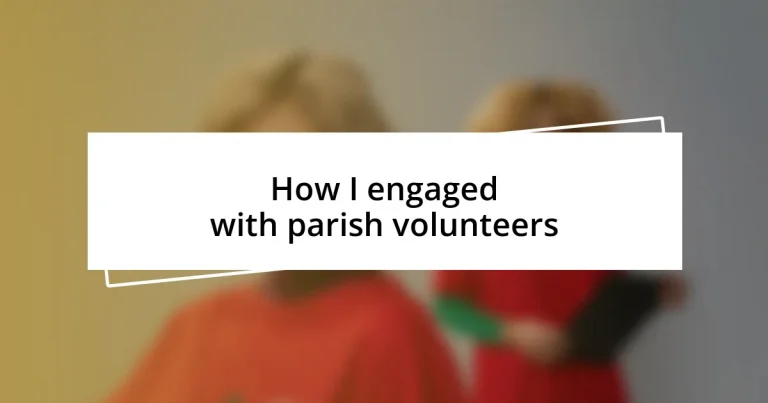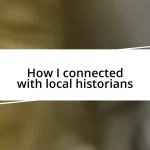Key takeaways:
- Engagement begins when volunteers feel their contributions are valued, emphasizing the importance of appreciation and recognition.
- Understanding diverse motivations—service, community, personal growth—can help tailor volunteer engagement strategies effectively.
- Creating a welcoming environment through personal interactions, snacks, and open communication fosters community and eases anxiety for new volunteers.
- Regular feedback and evaluations lead to improvements, helping volunteers feel heard and inspired to contribute further.
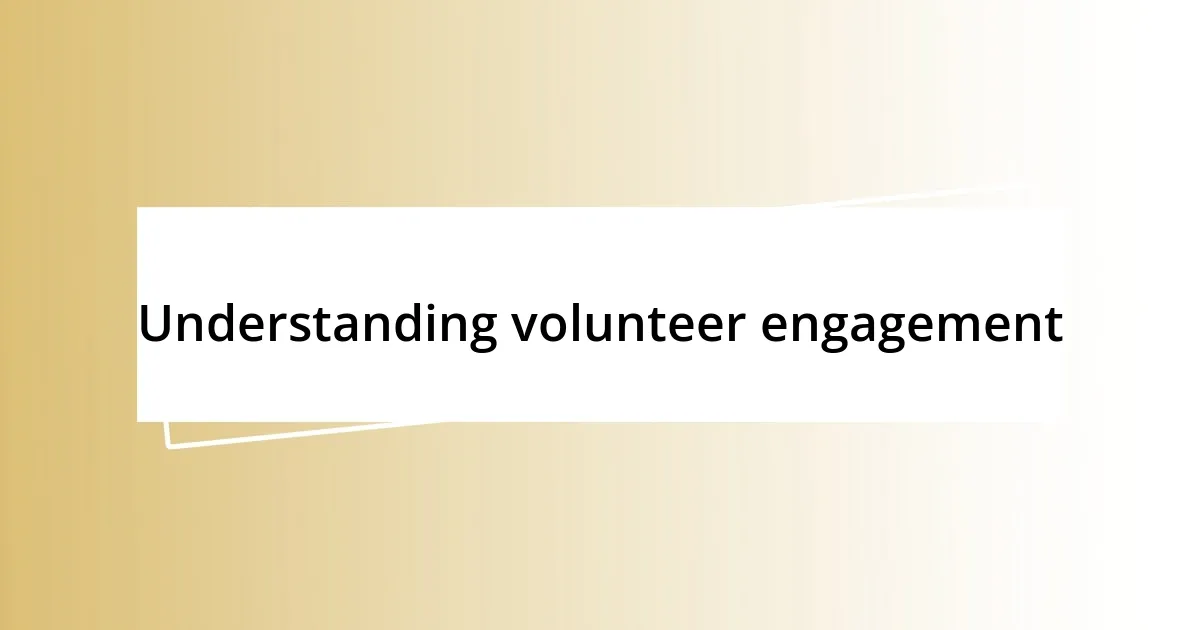
Understanding volunteer engagement
Understanding volunteer engagement is essential in creating a thriving parish community. I remember my early days volunteering; the excitement was palpable, but so was the uncertainty. Do volunteers feel connected and valued? That’s where engagement really begins—when they see their contributions making a real difference.
Reflecting on my experiences, I found that acknowledging volunteers—thank you notes, a simple phone call, or even a personal mention during an event—can profoundly impact their motivation. These gestures transform a feeling of obligation into one of belonging. Have you ever noticed how a little appreciation can turn a good experience into a great one?
Moreover, we must consider the diverse motivations behind why people volunteer. For some, it’s about service; for others, it’s about community or personal growth. I recall a volunteer who joined to honor her late mother’s memory. Understanding these underlying reasons can help tailor our engagement strategies to resonate deeply with everyone involved. What do you think drives your volunteers?
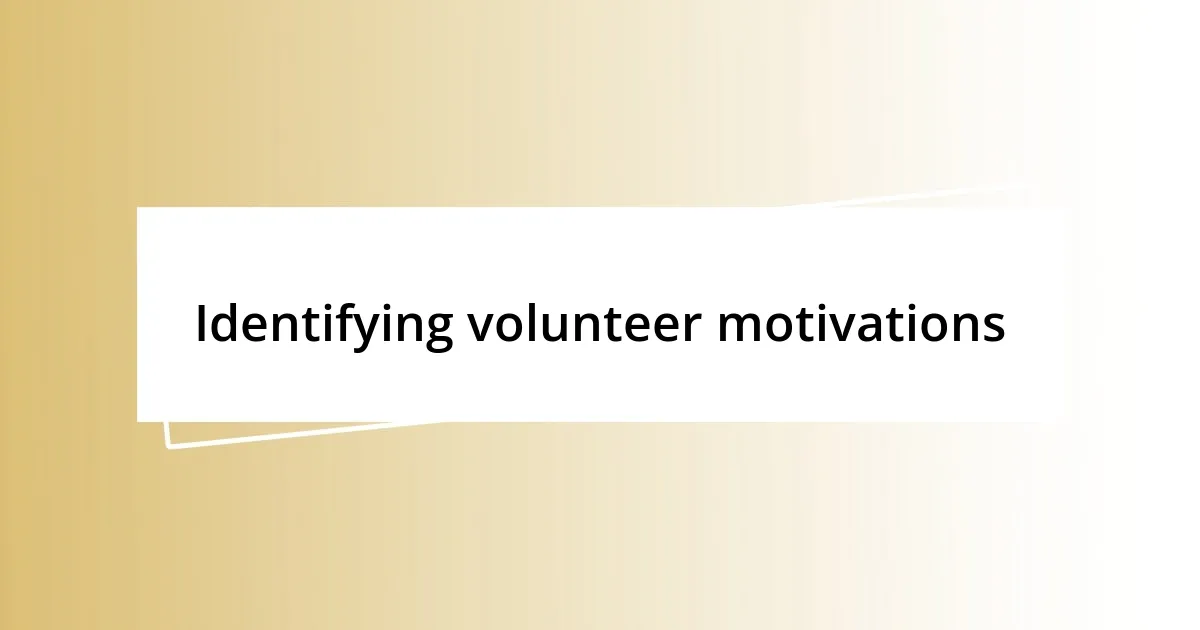
Identifying volunteer motivations
When I started engaging with parish volunteers, I quickly realized that motivations can vary greatly among individuals. Some volunteers come to find a sense of purpose, while others may seek social connections or a chance to develop new skills. For instance, I remember a shy teenager who volunteered primarily to meet new friends. It was enlightening to see how her initial nervousness transformed into confidence as she bonded with the team over shared tasks.
To effectively identify what drives volunteers, I found it helpful to observe and initiate conversations. Here are some insights that emerged from my experiences:
-
Personal Connection: Many volunteers have personal stories that fuel their desire to serve. Recognizing these stories can foster deeper connections.
-
Social Interaction: For some, the social aspect of volunteering is a key motivator. Creating opportunities for volunteers to connect can enhance their experience.
-
Skill Development: Volunteers often seek to learn new skills or gain experience. Offering training sessions can be a strong draw.
-
Sense of Accomplishment: The feeling of making a positive impact is crucial. Highlighting their contributions can amplify this motivation.
-
Community Belonging: A sense of belonging to a community often drives individuals to volunteer. Building inclusive environments is essential for ongoing engagement.
Understanding these varied motivations allows us to create tailored strategies that resonate and uplift our parish volunteers. It’s fascinating how a little effort in recognizing these motivations can yield such rewarding connections!
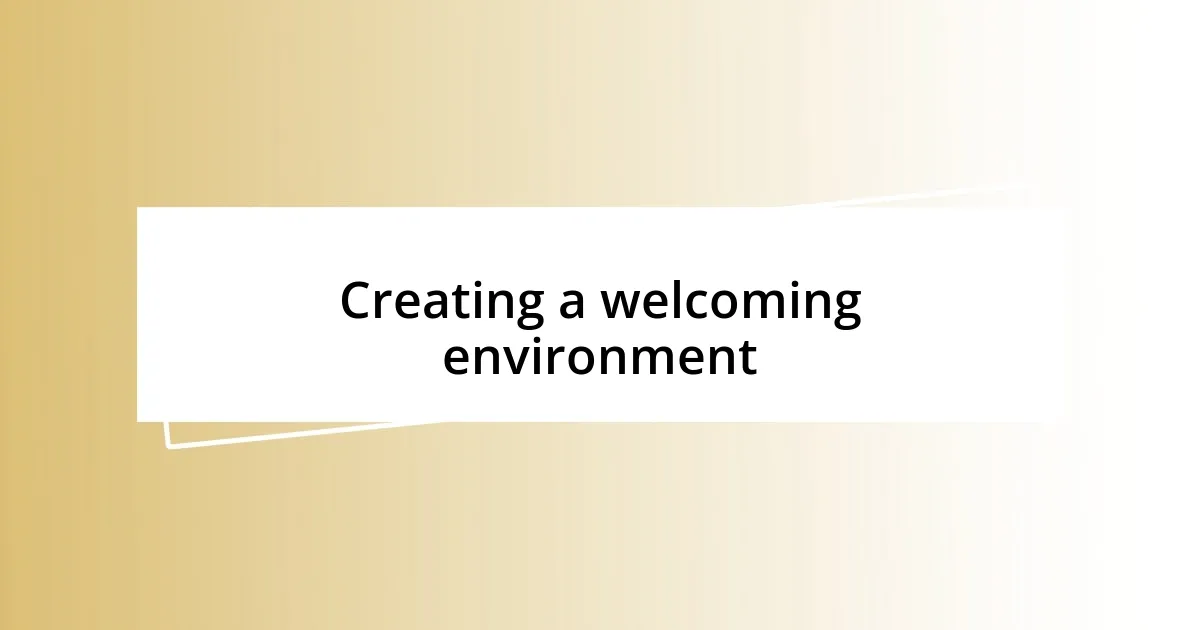
Creating a welcoming environment
Creating a welcoming environment is pivotal for fostering a sense of belonging among parish volunteers. I vividly recall the first time I stepped into a volunteer meeting; the warmth and friendliness enveloped me immediately. It’s extraordinary how a friendly smile or personal greeting can ease anxiety, making everyone feel part of a greater mission. Have you ever noticed how a few kind words can set a positive tone for the whole gathering?
To truly nurture this inviting atmosphere, I found that incorporating personal touches makes a big difference. For instance, during our initial meet-and-greet events, we always shared snacks and beverages. This simple act created an informal space where people could mingle, share stories, and naturally build relationships. Isn’t it amazing how food can act as a bridge, connecting people who might otherwise feel isolated?
Equally important is keeping the lines of communication open. I’ve practiced creating a safe space for dialogue by regularly checking in with volunteers, encouraging them to express their thoughts and suggestions. Just last month, after listening to feedback from a new volunteer, we implemented a buddy system that pairs them with experienced members. This not only enhanced their confidence but also established lasting friendships. What small changes have you made that resulted in significant outcomes for your community?
| Actions | Impact |
|---|---|
| Friendly greetings and personal interactions | Helps reduce anxiety and builds rapport |
| Offering snacks and beverages | Creates an informal and inviting atmosphere |
| Implementing a buddy system | Encourages confidence and fosters friendships |
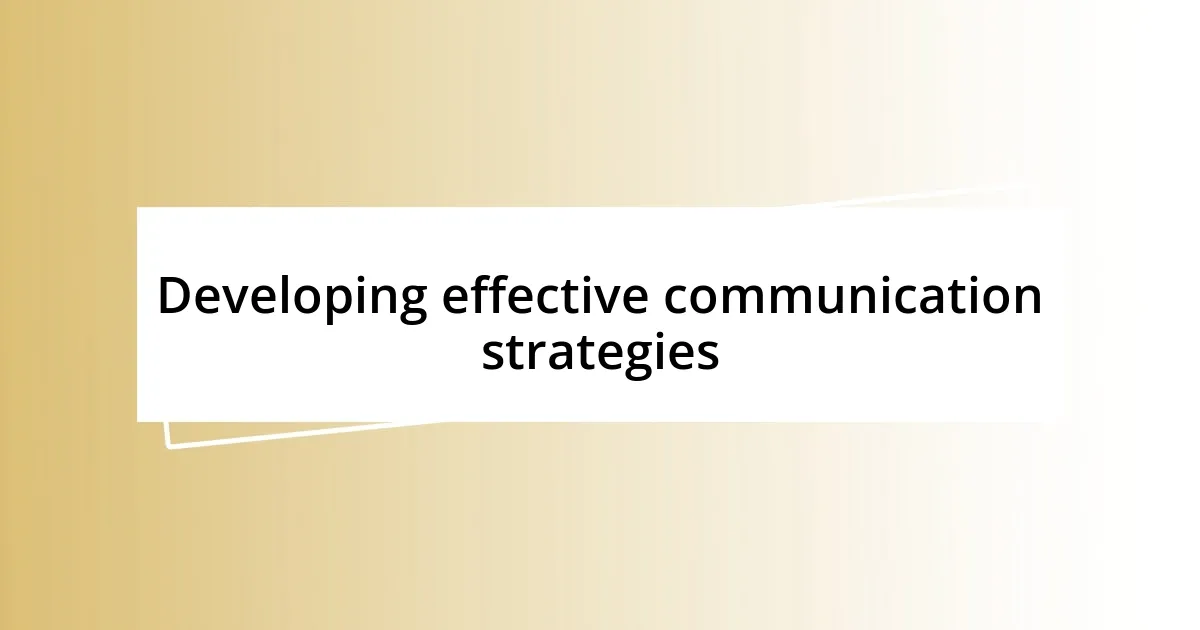
Developing effective communication strategies
Effective communication strategies are essential in nurturing and engaging parish volunteers. I’ve discovered that active listening transforms the way we connect. For instance, during a recent planning meeting, I made it a point to really tune in to concerns raised by volunteers. Their feedback not only guided our decisions but also made them feel valued. Have you ever found that a simple “Tell me more about that” can spark a conversation that changes everything?
Moreover, utilizing multiple communication channels can cater to varying preferences. I remember the excitement when I introduced a group chat for volunteers. The quick exchanges and shared updates became a lifeline, fostering camaraderie beyond scheduled meetings. It’s intriguing how technology can weave connections; do you think a simple text or quick call can sometimes bring people closer than an hour of in-person discussion?
Additionally, I learned that regular follow-ups can reinforce relationships and ensure that everyone feels included. After an event, I often send a thank-you email highlighting individual contributions. One volunteer remarked that receiving acknowledgment for her efforts made her feel like an integral part of our mission. Isn’t it amazing how a few heartfelt words can boost morale and inspire continued commitment?
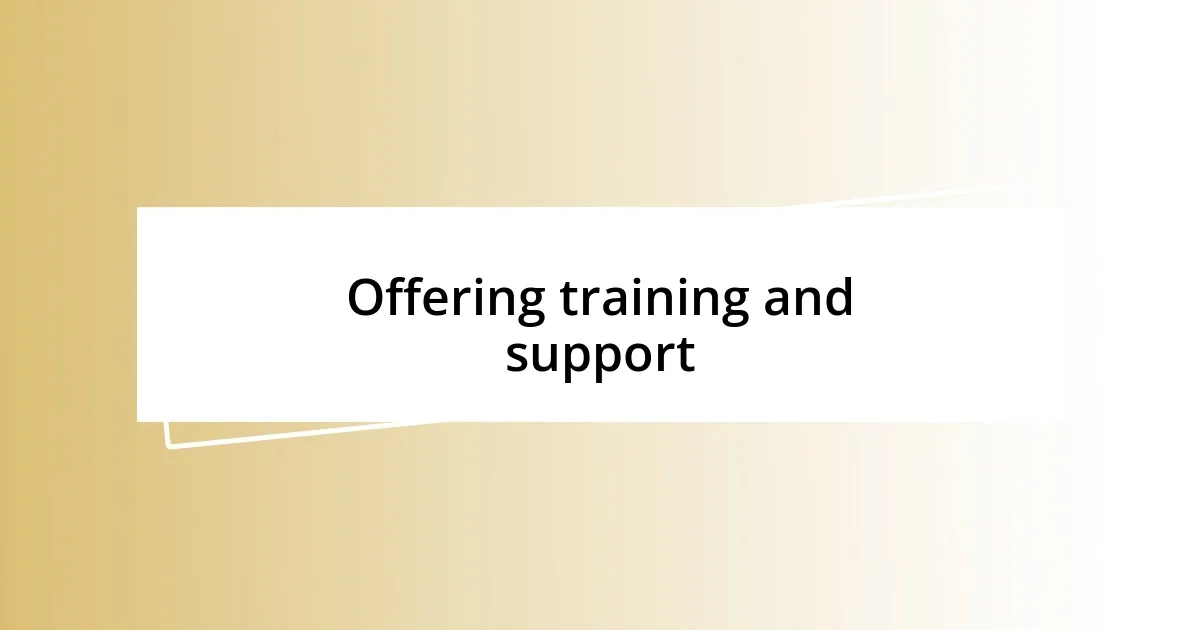
Offering training and support
Training and support play an essential role in empowering parish volunteers. I remember leading a workshop focused on specific skills, like event planning and fundraising strategies. The enthusiasm in the room was palpable as volunteers shared their experiences and learned from each other. Have you ever witnessed how a little training can turn nervous newcomers into confident leaders?
Offering ongoing support is equally crucial. After our training sessions, I made it a habit to hold informal drop-in hours where volunteers could come to ask questions or seek guidance. Last week, a volunteer approached me with a challenge she faced in her role. Our conversation not only clarified her concerns but also strengthened our relationship. Isn’t it interesting how simply being present can make a world of difference?
Additionally, developing a mentorship program within our volunteer community has been transformative. When seasoned volunteers took less experienced members under their wings, it created a ripple effect of learning and growth. I can still recall the moment a mentor and mentee team successfully organized an outreach event together. Their joy and sense of accomplishment were infectious, demonstrating how investing in each other fosters a united community spirit. How has mentoring played a role in your experience?
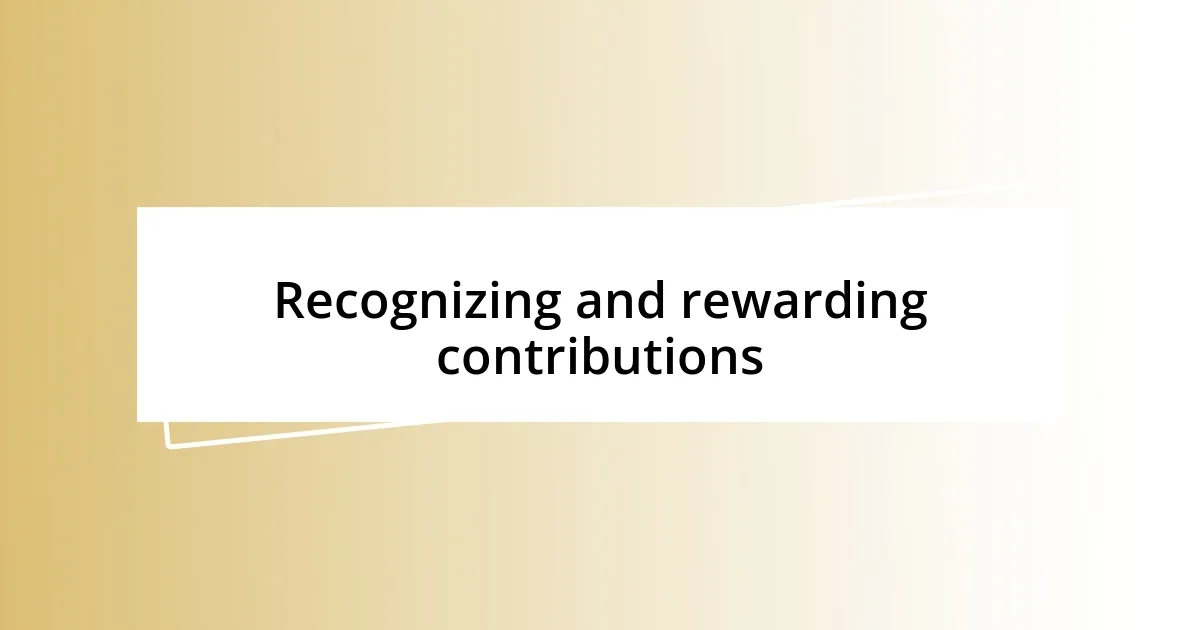
Recognizing and rewarding contributions
Recognizing and rewarding the contributions of parish volunteers is essential to keeping their spirits high and motivation intact. I recall organizing a volunteer appreciation night where I personally highlighted the incredible work of each individual. The smiles on their faces when they heard their names called out made me realize the profound impact genuine acknowledgment can have. Isn’t it striking how a little recognition can fuel someone’s passion?
Creating small rewards can also make a big difference. At one event, I surprised volunteers with personalized thank-you cards along with a small token gift—simple but thoughtful. One volunteer told me later that receiving the card made her day. It’s fascinating how these small gestures can linger in someone’s memory and encourage them to engage even more actively. Have you ever experienced the joy of receiving a hand-written note that really touched your heart?
Involving the whole community in recognizing volunteers is another effective approach. When I proposed a “Volunteer of the Month” spotlight in our newsletter, I was amazed by the positive response. It not only shone a light on the dedicated efforts of individuals but also inspired others to strive for greater involvement. Seeing your name in print or hearing it praised publicly is quite the motivator, don’t you think? Recognition creates a culture of appreciation that can elevate the entire volunteer experience.
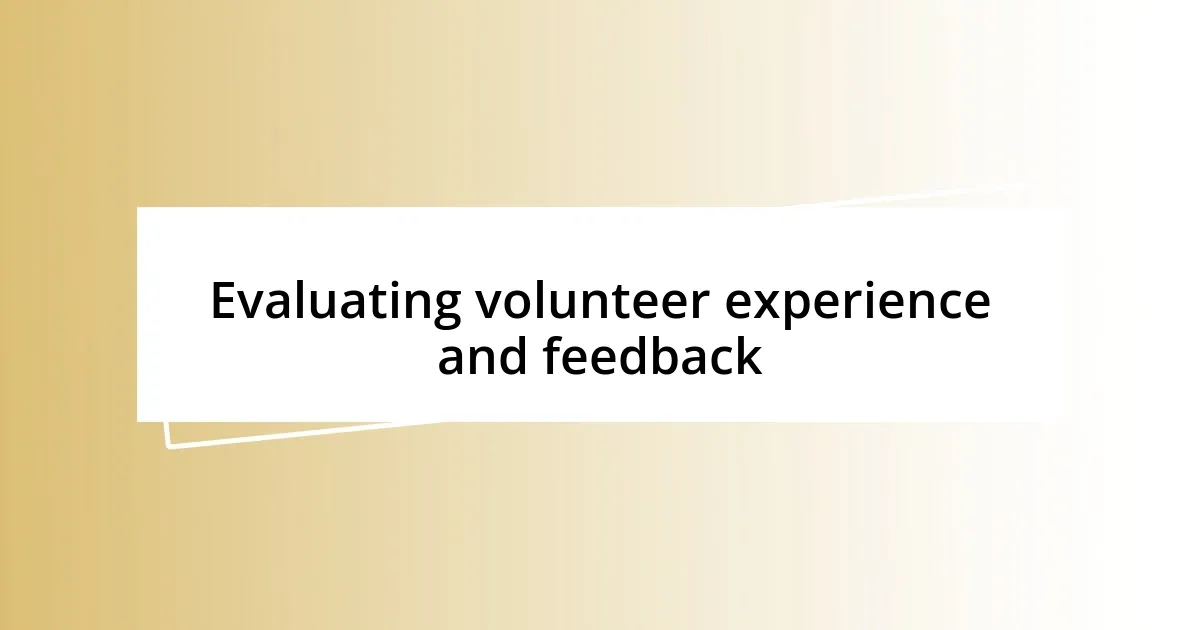
Evaluating volunteer experience and feedback
Evaluating volunteer experience and feedback is vital for understanding how we can improve our efforts. After each event, I began distributing simple feedback forms that asked volunteers what worked well and what could be better. One day, a volunteer shared that they didn’t feel fully equipped to manage certain tasks. That honest insight led me to tweak our training sessions, demonstrating how open communication can spark valuable changes. Have you ever thought how a few words from a volunteer could reshape an entire program?
I also hold informal debriefing sessions, where we gather for coffee and discuss experiences. I vividly remember a recent gathering where a volunteer expressed frustration about scheduling conflicts. That conversation not only solved an immediate issue but also opened our eyes to the need for creating flexible opportunities. Engaging in these discussions makes our volunteers feel heard and appreciated. Isn’t it incredible how just sitting down together can strengthen our community bonds?
Incorporating feedback into action is where the magic happens. For instance, after receiving suggestions on improving our outreach strategies, I organized a brainstorming workshop. Volunteers contributed innovative ideas, and we ended up launching a successful community event that exceeded our expectations. I was thrilled to witness their excitement when they saw their ideas come to life. Doesn’t it make you think about the power of collaboration and shared vision?












